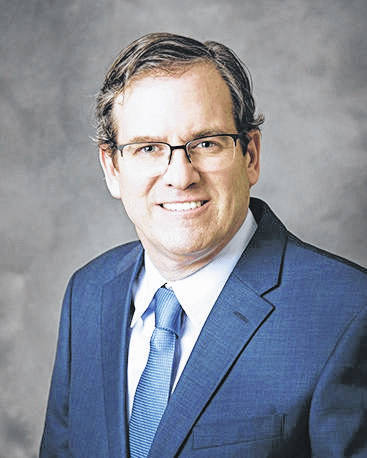MOUNT GILEAD — The Morrow County Healthcare Initiative Citizens Group (MC-HIC) heard about healthcare in Williams County, Ohio, and shared their concerns about healthcare and the hospital with Phil Ennen at their May 4 meeting.
HIC Chairman Jennifer Williams brought this nationally respected expert in healthcare to Morrow County to share his experience with the group. Ennen is the subject of the book, “The Hospital,” that was released this year.
Ennen was COO and then CEO for 32 years at Bryan Hospital in Williams County. He is presently serving on Ohio’s Pandemic Response Team. He spoke first about how healthcare and hospital business has become extremely complicated since the 1980s and 90s.
Ennen grew up in Bryan, Ohio in the far northwest corner of the state and trained in rural health care as he rose through the executive ranks of the Bryan Hospital. After introductions with the group, he opened the floor to questions.
MC-HIC member Lois Stauffer said, “We need help understanding who we are and what is our best shot at keeping healthcare accessible and relevant?”
Ennen said to look at the community surveys and consider what people might want versus what is practical or pragmatic.
He noted that people may say they want behavioral health, but it isn’t a likely possibility. Obstetrics might also be on someone’s wish list, but when so many hospitals close by offer that service, it probably isn’t practical. He added that both Obstetrics and behavioral health are very difficult services to start from scratch.
He said it is very hard when a service is discontinued, but there is real joy in finding new programs and services that are needed and feasible for the community.
How to increase numbers, market share
LeAnne Gompf asked what the best strategy is to increase market share. The group noted that Morrow County Hospital had a low market share, while Bryan Hospital was close to 70 percent market share.
Ennen said that Bryan Hospital had a time in the late 60s before he came when it was “about to be shuttered.” A good manager came in 1973 and began to turn things around. Ennen came shortly after that and over time Bryan increased its market share to 70 percent.
Ennen’s advice was “to become organic.” He rated building loyalty as a high priority. He said people should not only feel satisfaction with a hospital, they should feel loyalty. This would take commitment and not come overnight.
Eddie Lou Meimer asked how to know if it’s best to keep the status quo with OhioHealth, or go with another health system.
“Go out for bids,” suggested Ennen, “Even if you’re staying with OhioHealth.”
He noted that the hospital is an asset for the county and the leadership can learn from presentations from health systems. He was concerned with the documents he saw that there was no mention of a way to measure success toward goals for the hospital.
Ennen said improvement is needed in census numbers to keep critical care access status with critical care inpatient services.
“Corporate won’t take that much ownership. That has to come from the hospital and from the community,” Ennen said.
Loren Altizer brought up the subject of branding and that so many in the community have excuses why they don’t use the hospital. Yet many he talks to are very satisfied with the hospital.
Ennen responded that the people in healthcare are valuable to the community and they are usually involved members of the community. The three important things in a rural community are government, schools and healthcare. Alignment is important between the community leadership and the hospital going forward.
He said that healthcare isn’t entitled. There needs to be hard work to get and keep community support with every patient visit.
Ennen was impressed that Morrow County Hospital has no debt and excellent cash on hand. But then said there is no sign of investment and that is a concern. He said Bryan Hospital has carried lots of debt, but those investments brought growth and return.
Jennifer Williams made a comparison about the growth using Hinkle’s Marengo Hardware as an example. She said that the business has loyalty and also saw and listened to community needs, brought new products in, and made changes and improvements.
She said that the hospital not only needs loyalty, but to show they are responsive to community needs and ways to grow services.
“You are smart people and business people,” Ennen said as he encouraged them for the work they are doing and pledged his help if needed further.






